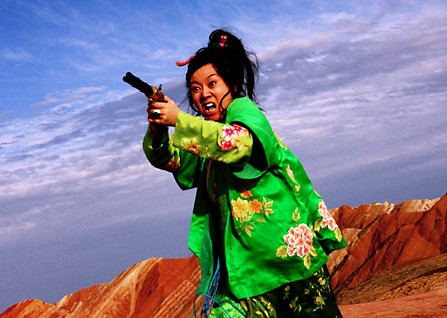Joel and Ethan Coen have inspired filmmakers and audiences with movies that range from “”The Big Lebowski”” to “”No Country for Old Men.”” But they began their careers as directors in 1984 with “”Blood Simple,”” a crime-noir story set in Houston, Texas. Director Zhang Yimou pays tribute to the Coen brothers’ debut with “”A Woman, a Gun and a Noodle Shop.””
Wang (Ni Dahong) is the miserly owner of a rundown noodle shop in the middle of a mountainous desert near China’s Silk Road. He suspects his wife (Yan Ni) of having an affair with an employee, Li (Xiao Shen-Yang, making his film debut here). Wang secretly meets with patrol officer Zhang (Sun Hunglei) and asks him to investigate. After Zhang confirms the affair, Wang hires him to kill his employee and wife.
“”A Woman, a Gun and a Noodle Shop”” marks a shift from the director’s other U.S. theatrical releases of the past decade. Instead of epic dramas filled with deadly serious action sequences that sweep across the screen, the film presents black humor, mild slapstick and sudden violence that reflect the personal drama of its characters.
“”A Woman, a Gun and a Noodle Shop”” is filled with many inventive details that transform Texas into Gansu province. The gun in question is a novelty from the West brought to the shop by an Arabian trader. The police, in their characteristic royal blue armor, patrol together on horses and use a wind whistle that sounds remarkably like a modern emergency siren. Wang’s safe lock is styled after an abacus.
Many conversations move with a fun snappiness that wouldn’t feel out of place in an Edgar Wright movie. In fact, the opening scene where Wang’s wife and the trader haggle over the gun’s price would fit right in with “”Scott Pilgrim vs. the World”” or “”Hot Fuzz.”” While these exchanges flit by all too quickly, Zhang also gives the story room to breathe and settle in. There are long stretches where no one says or needs to say anything as they go about their serious and absurd affairs.
Zhang still hews to the visual style of his period films he established with “”Hero”” in 2002, which is unsurprising because cinematographer Zhao Xiaoding has been a frequent collaborator since then and returns again for this film. Brilliant colors, a mark of Zhang’s style, saturate the screen scene after scene. Characters wear clothes that reflect their personality, from the bright pink outfit of the sensitive, slightly effeminate Li, to the grass-green robe worn by Wang’s unnamed wife who yearns to leave her loveless and abusive marriage.
Sun confidently inhabits the role as the patrol officer Zhang. Stone-faced throughout most of the movie, he reveals his would-be assassin’s professionalism with each careful adjustment of the crime scene in an effort to mask his presence. In contrast, Xiao brings just enough overstatement to his character through his facial expressions and voice — at one point he even lets out an effeminate whimper straight out of Chinese opera.
When artists set out to pay tribute to their peers or their role models, the results tend to be boring and self-absorbed. Zhang gives praise to the Coen brothers’ entire body of work with “”A Woman, a Gun and a Noodle Shop”” and reveals something new for his own repertoire — a sense of humor.









